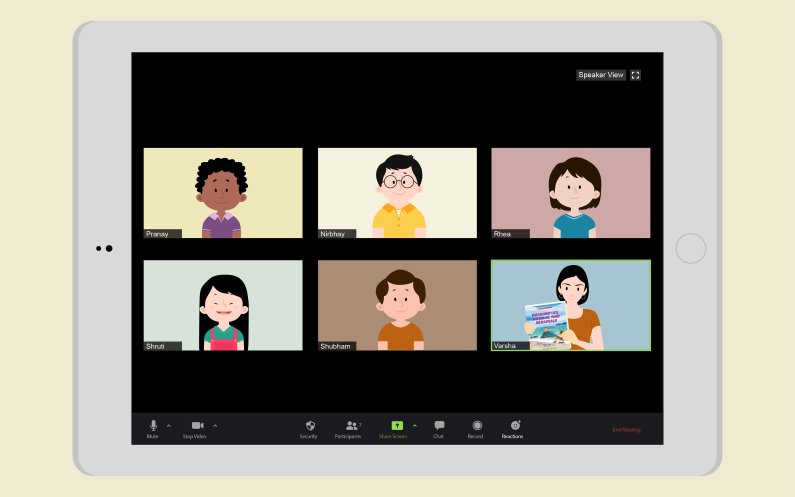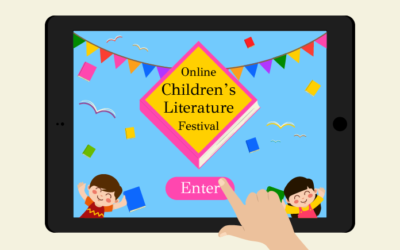Essay
What I’ve Learnt From Hosting Online Literary Events
There is nothing quite like the excitement of a school preparing for an author visit. Libraries and classrooms buzz with anticipation. Children make and put up posters to welcome the author. Some read up a little and even go as far as to buy books in advance to get them signed. When an author visit coincides with a bookfair or a lit fest, children look forward to it with an eagerness and enthusiasm that sets the stage for the author, laying all the groundwork for a successful literary event.
But with schools shut, children are at home and author visits have moved online. Instead of anticipating an inspiring literary interaction, children are perpetually distracted—by pets, doorbells, parents, everything.
Events that used to be held at bookshops are now virtual too, and likely to remain so for a while.
Without the conducive ambience of a bookfair or a bookstore, how could I hope to make a literary event as exciting as it used to be in the pre-COVID era? How could I inspire readers through virtual events? These were questions I asked myself time and time again as online literary events began to take the world by storm.
The Biggest Challenges Of Moving Online
When I started doing virtual events, I worked hard to replicate the feel of physical events. Like most other writers, I have my set of tried and tested activities, which sometimes involve group work and at other times, individual handouts. It was only natural for me to tweak these activities and use them for virtual sessions.
However, I soon realised that this approach was flawed. Parents rarely print handouts in advance even if they receive them in time. A drawing or colouring activity goes awry when children wander away in search of colours and then forget to come back. Group work is also difficult because even though breakout rooms exist, organising the details often requires so much explanation that there is no time for anything else.
Additionally, the attention span of participants is usually shorter during online events because it is all too easy to get distracted, especially since social media is such a powerful contender. I also found that I could not read out excerpts as long as the ones I would read at physical events because participants would invariably interrupt with complaints of internet hiccups. Thanks to frozen videos and cracking audios, the magic of a book-reading was broken, over and over again.
Every author knows only too well that an activity that works brilliantly with one group may fail miserably with another. When videos are switched off, I cannot see the faces of my participants. I cannot then judge whether an activity is working or not, until I see the number of participants reducing, by which time it is already too late to improvise.
Often, to take a little attention away from my face, I would share my screen. To my dismay, I realised that some online platforms allow participants to annotate on the shared screen and children have a field day scribbling all over it!
The first time this happened to me, I had no idea what to do, so I simply stopped sharing my screen. I looked it up later and discovered that the host needed to disable annotations to prevent this. So, the next time I encountered this problem, I tried to explain to the moderator what she needed to do, but it took so long to guide her through the process of turning annotations off that I realised I needed a better solution.
The chatbox is another can of worms. I have had children share not just endless greetings, but also, on one occasion, links to virtual games complete with instructions on how to play. A teacher in the room told me a little apologetically that discipline was sometimes an issue and we simply had to ignore bad behaviour. That is what I did, but it was less than satisfactory.

(Image via Varsha Seshan)
Dealing With These Challenges
After a couple of difficult virtual sessions, two things became clear to me. One, if the participants are enthusiastic about an event, the problems of inattention and mischief do not crop up, and two, stating the rules clearly at the outset creates a framework within which to conduct an event.
The latter helped overcome more challenges than I imagined. For instance, telling children not to scribble on my screen after they have started doing so rarely makes them stop. On the other hand, if I lay down the rules before sharing my screen – that I can only share the screen if they know how to behave — I can conduct my activity without a glitch. The same rule applies to using the chatbox. Discussing the codes of behaviour that must be followed at the very beginning has helped make a world of difference to my virtual sessions.
To avoid having the internet wreak havoc on the magic of book readings, I shortened the excerpts I read aloud. I also realised the need to repeat each instruction several times right through any activity because participants keep leaving and coming back when they face technical trouble. This repetition reduced the number of interruptions drastically!
Virtual events often have so many participants that having a moderator is a good idea, if only to regulate who asks the next question. Answering questions while also looking at the rapidly changing list of participants is virtually (pun intended) impossible. A moderator can help smoothen the process so that participants don’t get so frustrated with being ignored that they switch on their mics and create chaos.

(Image via Parent Map)
Exploiting The Advantages Of Virtual Interactions
Most importantly, the amount of time we spend in front of a screen is a clear indicator of how addictive it can be. I realised that if I exploited this attraction, my literary event was more likely to be successful. Children, especially, have access to individual devices only at virtual events and this creates the possibility of engaging with them through new kinds of activities.
Trial and error was my best way forward, but I attempted to overreach more than once. For instance, I quickly discovered that a quiz that involved a shared screen, such as on a platform like Kahoot, was far too complicated. However, a short book quiz created with the wonderfully simple Google Forms worked so well that I continued to receive responses days after the event – a testament to the high level of participant engagement.
Spending a little time designing online literary activities is thus well worth it, for it encourages my readers to engage with the book again later. Another advantage to exploit is that a book sale is just a click away and sharing links along with the book activity or in the chatbox encourages readers to explore and buy books at their leisure. It was, in fact, a teacher during a school visit who suggested this to me because of the number of times children asked me how to buy my books!
Once the rules of use of the chatbox are laid down, I show children a book cover and invite them to use the chatbox to share what they see and imagine. They thus express their ideas and ask questions without all the chaos of background noise. Paying such close attention to the detail of an illustration is possible only at a virtual event and I like making full use of it to set the tone of quiet listening.
With older children who are less likely to wander away, I invite the moderator to select four or five children who set a challenge for the others, by coming up with books that participants need to find – a book whose title contains the letter ‘x’, a book with a character whose name starts with ‘G’, etc. I give the children six minutes to come back with as many books as they can. An activity of this sort serves many purposes: it gives the participants a break from the screen, reminds them of books they’ve read and loved, and begins fresh conversations about books the others may not have read.

(Varsha Seshan’s virtual book readings: Image via YouTube)
Creating Something New
Ultimately, it’s the novelty factor that draws people to the screen, and it is this that I try to capitalise on during my events. Replicating a physical event creates dissatisfaction, for a virtual event can rarely, if at all, compare favourably.
Instead, exploring the advantages of technology creates something new and magical. The options are vast and varied, in addition to which online platforms are constantly evolving. With innovation and novel forms of interaction, I am now at a point where I feel that virtual events have the potential of becoming the preferred form of engagement with readers even in a post-COVID era, if only because the reach is so much greater.

Varsha Seshan is a writer of lists, emails, detailed notes to self and children’s books. She has written 15 books for children and has twice been shortlisted for the Scholastic Asian Book Award. When she is not writing, she is usually travelling, working with children or dancing. She conducts reading and writing workshops for children and adults at schools and libraries. She also facilitates a writers’ club for pre-teens at a school in Pune (India), where she lives. A classical dancer with over 25 years of training in Bharatanatyam, she has performed extensively in India and abroad. Find out more at www.varshaseshan.com
Read her articles here.




